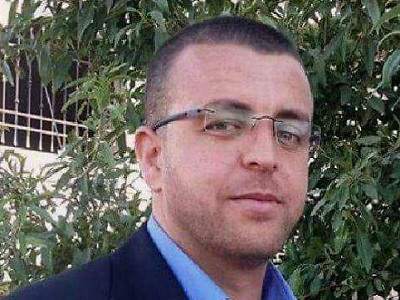
The Israeli authorities have been forcing treatment on Palestinian hunger striker Muhammad al-Qiq in violation of medical ethics, medical rights group Physicians for Human Rights Israel (PHRI) said Tuesday.
In a statement, the group Israel called on doctors in HaEmek Hospital in Afula to “stop forcing treatment upon (al-Qiq) and pressuring him to end his hunger strike.”
PHRI spokesperson Lital Grosman stressed that the forced treatment did not amount to force-feeding, a controversial practice approved by Israeli lawmakers in July last year that Israeli doctors have so far refused to implement.
PHRI’s announcement came a day after one of the group’s lawyers visited al-Qiq. The 33-year-old journalist from the southern West Bank town of Dura has now been on hunger strike 55 days to protest his administrative detention — internment without trial or charge.
The rights group said it was “clear” that al-Qiq had been “occasionally subject to medical treatment against his will and consent, in violation of medical ethics and the Patient’s Rights Law.”
It said the hunger striker had been “hooked up against his will to an infusion of salts and vitamins, and blood was taken with the permission of the hospital’s ethics committee.
“Al-Qiq was tied to the bed and forcefully held down by prison wardens while a member of the medical staff made the infusion. For four days al-Qiq remained tied to the bed, hooked up to the IV drip, while pleading for its removal, to no avail.”
On Thursday, PHRI said that doctors removed the drip and did not re-administer it. However, doctors attempted on Friday to pressure him to take a can of liquid food in order to break his strike.
PHRI said that these actions “contradict the World Medical Association’s declarations on hunger strikers, to which medical personnel in Israel are committed, including the Malta Declaration which forbids both applying pressure to end a hunger strike and forced medical treatment.”
It also cited the Tokyo Declaration, which it said “forbids physicians’ participation in torture, including the forced feeding or treatment of hunger strikers.”
PHRI said the actions had not been enough to “break” al-Qiq’s hunger strike and did not constitute force-feeding, but that they “constitute significant violations of medical ethics.”
Despite assurances from the hospital that it “had no intention or desire” to force-feed its patients, Grosman expressed concerns that doctors would continue to apply pressure on al-Qiq to break his strike. “We hope the medical staff will respect his wishes,” she said.
The group added that the Israeli Prison Service had so far not responded to a request that an independent physician be allowed to see al-Qiq.
Rights groups and medical experts consider force-feeding tantamount to torture, with the Israeli Medical Association stressing last year that its doctors would “continue to act according to medical ethics, which prohibit doctors from participating in torturing prisoners.”
On Monday, PHRI and Palestinian prisoners’ rights group Addameer submitted a petition “demanding to halt the shackling of al-Qiq to his bed, arguing that he poses no danger or could not escape and that there is no justification for his shackling.”
PHRI condemned Israel’s use of administrative detention — describing it as “the basis of this and previous hunger strikes” — and called for al-Qiq’s immediate release.
In recent months, Israel has dramatically increased its use of administrative detention, with the number of detainees denied trial soaring from around 340 in September to some 660 by the end of December.
(MAAN)




